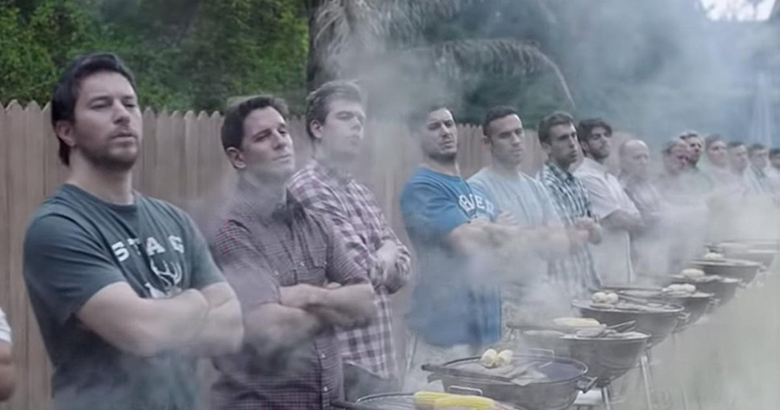 Razor Blade Uproar
Razor Blade Uproar
Tulsa, Oklahoma (1984)– Cal looked a lot like Denzel Washington, but taller, more muscular, a little more handsome and a lot more stylish. Cal belonged on the cover of GQ magazine.
We had just finished a barbecue lunch together when a skinny white moron across the room fired some provocative comments toward Cal.
Having just finished his lunch, Cal stood up, wiped his mouth, looked over toward the moron, gave him a small nod and a little smile, then casually walked out the door.
Confused, I followed Cal across the gravel parking lot and settled into the passenger seat of his Buick. Buckling my seatbelt, I said, “I’ve never seen racism that blatant before.”
“That wasn’t racism,” said Cal, “that was trash-talk.”
Stupefied, I looked at him with my eyebrows jacked up and my jaw hanging open.
“That man did not have the power to deny me a job, or a promotion, or a mortgage, or a seat in a restaurant. He couldn’t refuse to sell me a home or hold me back in any way, so he doesn’t have the power to demonstrate racism. He can only say stupid things, and there’s no law against being stupid and rude.”
I didn’t agree with Cal and I’ve never found anyone who did. But I’ve always admired the fact that he refused to let that skinny white moron ruin his afternoon. I honestly believe Cal had already forgotten the whole episode before he opened the door to get in his car. My friend Cal was country-club elegant and staggeringly sophisticated because that’s who he chose to be.
I’ve never been country-club elegant or even slightly sophisticated but Cal didn’t hold those things against me.
He was he, and I was me.
Cal should never have had to endure unprovoked slander from a stranger. No one should have to. But what Cal taught me that day was to separate actual damage from imagined damage.
I believe most men in America agree that any abuse of power is unacceptable, whether it comes from superior physical strength or authority in the workplace. Likewise, a hostile work environment is unacceptable because the fear of losing a paycheck is a threat as real as physical assault. Consequently, it is the responsibility of management to make sure every employee feels welcomed and safe from abuses of power within the company.
I approve of the idea behind the Gillette ad and I’m proud of Marc Pritchard for allowing it to go forward. I believe all of America’s big corporations should follow the lead of P&G and rise up like a concrete dam against the fast-rising waters of social hostility.
But I feel the Gillette ad could be stronger. It needed to be sharper, more pointed. To put it plainly, the visuals are weak. At least half of them blur the focus of the ad and blunt its point.
The ad begins with the faces of four men, each with a lost look in his eyes. Then we see a brief shot of a movie screen with a girl giving a boy a kiss on the cheek. Then a band of boys bursts through the movie screen. Strange, I’ve never seen or heard of that happening. Then we see a brief shot of a boy being comforted by his Mom. We know he has been bullied because of the words we read in the thought balloons. This is one of the few powerful moments. But that moment is ruined when the boys who jumped through the movie-screen run through the living room and the Mother and her son don’t seem to notice. This is where I get lost. That band of boys feels, to me, like a bunch of kids playing Capture the Flag at summer camp. And that long line of young men standing behind their backyard barbecue grills, wearing expressions of, I don’t know, arrogance, or boredom, or intestinal discomfort; am I supposed to recognize that as toxic masculinity?
Given these obscure visuals, I worry that “toxic masculinity” might be a brush that’s a bit too broad. If we are going to energize and empower a phrase like that, can we at least decide what will be inside – and outside – its boundaries?
Words are my business, and “toxic masculinity” is an astoundingly powerful accusation. Now that this phrase has been unleashed, I’m certain we’ll be hearing it a lot more often.
But at what will it be aimed?
Is backyard grilling toxic masculinity? Is a group of boys running through the city toxic masculinity? Is arm wrestling toxic masculinity? Is it toxic masculinity for a 10-year-old boy to cup a fart in his hands and then hold it under the nose of his best friend?
I have a confession to make: there’s a scene in the 1992 John Goodman movie, The Babe, where Babe Ruth meets the Queen of England and says, “Pull my finger.” And she does. Twenty-six years ago, that scene made me laugh so hard I almost wet my pants.
It was childish of Babe Ruth to do that to the Queen of England. But was it toxic masculinity?
And it was stupid of me to think that scene was funny. But was it toxic masculinity?
The Gillette ad needed to sharper, stronger and more focused.
When I can’t find a paper towel, sometimes I wipe my hands on my blue jeans. Is this toxic masculinity? Seriously, I need to know. To escape being labeled as toxic, do I have to become as county-club elegant and as staggeringly sophisticated as my much-admired friend Cal?
Roy H. Williams